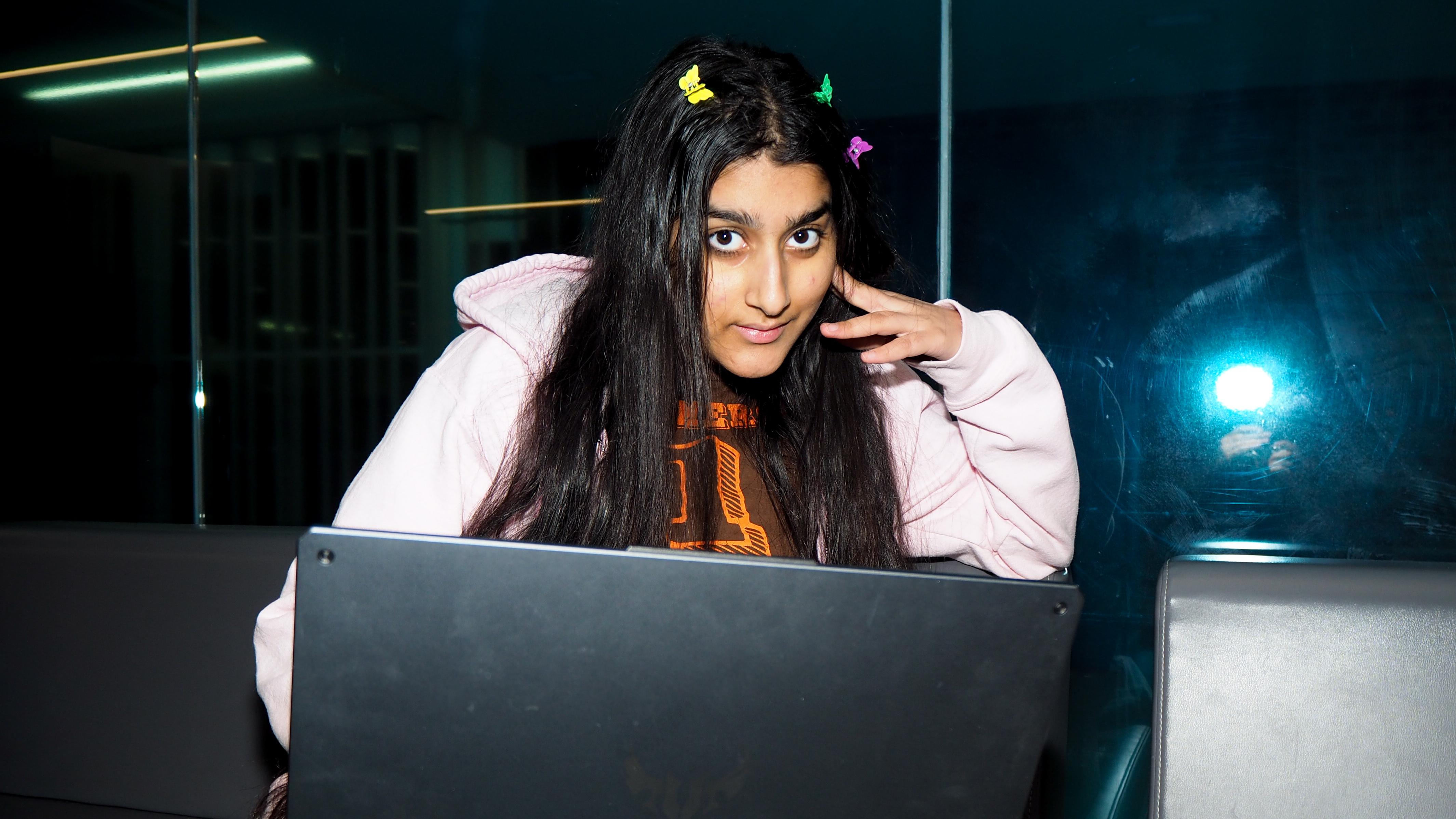Women at Ryerson say they’re desensitized to the abuse they face when gaming
Words by Daniella Lopez
Visuals by Jes Mason and Laila Amer
Content warning: This article includes mentions of sexual harassment
Sitting alone in her room staring at the double-monitors setup for gaming, Katrina Bustamante, a second-year media production student, was getting ready to enjoy one of her pastimes—playing video games. But before she could start playing, she needed to find a Discord channel with other gamers who were also playing the same games.
Many of the games Bustamante plays are multiplayer, meaning players can interact with others and compete as a team or against one another. Bustamante had joined numerous Discord servers at the time, so finding a group to play with wasn’t an issue. After finding a squad, which consisted of men around her own age, she played the game normally.
However, minutes after the game ended, she received a message from a man she had just played with, saying he had masturbated to the sound of her voice while playing the game “because she sounded hot.”

Shocked and feeling violated by what he told her, Bustamante quickly messaged back, “What the hell is wrong with you? I don’t believe you.” The following message she received was a picture confirming what he had said.
She was just 17 when it happened.
Now more than ever, women are being recognized as larger portions of the gaming community. 50 per cent of gamers in Canada identify as women, according to a 2020 report from the Entertainment Software Association of Canada. Yet while half of gamers in Canada are women, the space is still heavily male-dominated and entrenched with misogyny.
A report from Reach3 Insights, a market research company, found that 77 per cent of women gamers experience gender-specific discrimination when gaming, including name-calling, receiving inappropriate sexual messages, gatekeeping and dismissiveness, to name a few. These are issues women gamers at Ryerson say they know all too well.

Alison Harvey, an assistant professor of communications at Glendon College at York University, says the history of video gaming contributes to the harassment women continue to face today. Gaming was largely seen as a “masculine pursuit” until 2007 when the Wii was introduced and became marketed as an “intergenerational” console. Companies then began to realize there were multiple different types of gamers besides the stereotypical teenage boy. Yet, older video games were often marketed toward men with over-sexualized female characters, which created a “safe space” for masculinity, particularly toxic masculinity, Harvey says.
As a result, women gamers at Ryerson who play online or competitively say they have to grow tough skin in these spaces because the harassment they receive is a regular part of gaming culture. They say they’ve been desensitized to the level of harassment they face when gaming and have resolved to understand that calling out problematic male behavior will often lead to more of it.
“[Men] just don’t care,” Bustamante says. “They just don’t see you as a person. You’re just some piece of meat to get off to.”

hen she speaks while playing video games, Angelina Nayyar doesn’t know who will be on the other end. Sometimes she encounters men who treat her like just another gamer. Other times, she has to deal with men who are quick to harass her the minute they believe she’s not good enough to play against them.
One day, as the second-year film studies student was getting ready to play Mortal Kombat, a game where players fight opponents until one character is left standing, she randomly matched with a male player also looking to play the multiplayer game. When she matched with him, she knew he wasn’t sitting there alone—he was with his friends or at a party, from what Nayyar could infer from his microphone.

She stayed quiet for most of the game, but when she did speak up, the man on the other side was shocked to find out he was playing against a woman.
She eventually won the game and instead of being able to bask in her victory, she was met with the sounds of his friends making fun of her opponent for losing to a girl.
Nayyar says her opponent assumed he wasn’t playing against her and that instead, it was her brother playing in the background, while she spoke into the microphone. “Give your brother the controller back,” they said.
Amanda Cote, an assistant professor of media studies and game studies at the University of Oregon, says women gamers often face harassment when gaming because they’re seen “breaking conventions” when they play. This is because gaming has been heavily associated as an activity for young men and so, they are seen as the “expected audience.”
Many men want to keep the gaming space as one for them, thus “a lot of people will work very hard to protect stuff that they see as theirs,” says Cote. At minimum, they may question why a woman wants to enter the space or at worst, assume she’s there with bad intentions. Perhaps for attention or to pursue a romantic connection with a man, Cote says. Therefore, women are seen as “out-group” members in this space and face frequent questioning as to why they are involved.
Nayyar first started playing video games in Grade 5; she would use her sister’s iPod to play Minecraft because she wasn’t allowed to have a phone until high school. Now, she enjoys story mode games, like The Last of Us Part Two, where she’s allowed to be in the story while interacting with the characters and making decisions that will lead to a conclusion.

She enjoys the story writing of each game, but says that has more to do with being a film student than anything else. “I really like the art and gameplay of [storymode] games and I think video games are a unique medium.”
While she doesn’t think of herself as a “female gamer,” she acknowledges her love for gaming, specifically how it can bring people together. When she meets another woman gamer, she’s quick to bond with them because they can relate to each other.
“It’s the shared experience of knowing what it’s like to be a female gamer and laughing about things guys say to you on video games or laughing about funny things that happen as a girl gamer.”
Nayyar says the only way gaming culture will change is if the younger generation changes its outlook on women in gaming. “[Boys] have these misconceptions that girls have it so easy, it’s actually the opposite,” she says. Nayyar explains that some boys believe women play on “easy mode.” It’s a non-existent concept that boys will continue to believe until something in the space changes.
This constant harassment stems back to the idea that gaming was and is still made for men. “For male players, we assume they’re there because they like games,” says Cote. “For female players, because they’re violating a norm of who games are for, people have a lot more questions about what they’re doing there.”

fter a long day, Rania Elhilali readied herself to play her favourite video game, Counter-Strike: Global Offensive, colloquially known as CS: GO. In her room, she waited for the game to load, knowing the next two hours would be her time to escape the world around her. The game is a multiplayer first-person shooter game that pits two teams against each other in objective-based game modes.
Because CS: GO is a multiplayer game, Elhilali had to find a lobby to join. Once there were enough people, the fun began and due to the high-intensity aspect of the game, she had to turn on her microphone. But the moment she spoke is when everything crumbled. When fellow players heard she was a woman, they banded together and kicked her out of the game. So much for an escape, she thought.

Since the first time it happened, being kicked out of CS: GO has become a regular routine for Elhilali. She’ll join rooms, but once players find out her gender, she’s kicked out. The first time, Elhilali remembers crying for two reasons. First, she was angry because she played well and didn’t understand why other players wanted to exclude her. Later though, she cried when she finally understood why she was excluded: because she was a girl.
“That shouldn’t even happen,” she remembers thinking.
Many shooter games like CS: GO are played by men. According to a survey by Newzoo, only 26 per cent of women identify as shooter video gamers. And only 20 per cent of CS: GO players are women.
Often, society assumes women and men will have different interests in video games. Cote says this is due to socializing people of different genders towards different interests. This is where the idea of gendered games comes into play; boys are assumed to like games with violence such as Call of Duty or Mortal Kombat, whereas girls are assumed to be more attracted to non-violent “girl games,” like Animal Crossing or The Sims.
Marketing and advertising campaigns rely on and reinforce norms about gender which shows consumers whether a certain game is meant to be bought by them. Cote adds when consumers realize they’re not the target audience, they choose not to buy the game for fear of being “excluded or an afterthought.”
Elhilali began playing CS: GO five years ago and it quickly became her favourite shooter game because it was straightforward. The game solely relied on a player’s skill to win and she enjoyed how she could continuously improve.
Before then, she mainly played video games on her Xbox or Wii. She dabbled in Call of Duty when she was 15 years old but quickly found the game to be “disastrous” due to the predominantly male community. “I clearly felt not welcome whenever I played.”
Video games have helped the second-year sport media student make friends and connect with others who play the same games as her. Mainly though, gaming is her escape; it’s calming, even if the act is stressful.
When playing CS: GO, Elhilali says she’s “heard it all,” from racial slurs to derogatory language from men. More often than not, she’ll call out those people and try to educate them because “words really do affect people.” Yet, she’s also aware that some people in gaming spaces are a “lost cause” and there’s no hope in helping them.

In 2014, an online harassment campaign called #GamerGate targeted women in the industry and promoted sexism within the space. Zoë Quinn and Brianna Wu, two game developers, faced a majority of the harassment including rape threats, death threats and doxing, which is publically revealing a person’s private information online.
GamerGate was viewed as an anti-progressive movement led by right-wing extremists. It forced the gaming industry to review its treatment of women and minorities within the space.
Harvey says having a more diverse workforce when developing games can also help fix parts of gaming culture that harass or exclude women. In 2021, women made up 30 per cent of game developers worldwide, according to Statista.
If the same people developing games spans decades, they might have “old fashioned” or “traditional” ideas surrounding the making of the games. Thus, diversity can be an important factor in fixing “parts of the culture that are exclusionary,” Harvey explains.
She says misogynistic, homophobic and racial slurs are particularly common in competitive fighting games. And because these spaces are not moderated, they can become a place for hate speech. It’s not just apparent in video games though, “with unfettered speech, there can be rampant kinds of harassment that ensue,” she explains.
Elhilali says constantly hearing crude remarks has impacted her, whether or not they are said to her or someone else. She tries to report people when she thinks they’ve crossed a line. Sometimes, the report is successful and she’ll find out the person has been temporarily banned; other times, it’s not as easy.
“This rarely happens, but [players] can be banned off the game. It mostly happens to people who are hacking. I haven’t seen someone who’s said bad remarks get banned.”
Bustamante says she’s become desensitized to men trying to sexualize her and she doesn’t let them ruin her gaming experience.
According to Bustamante, gaming also has a rampant grooming problem. The FBI reported in 2021 that an estimated half a million online predators are active every day, and because gaming takes place online, these spaces can be dangerous for underage users. In 2021, the FBI launched a campaign to warn parents of the dangers that could ensue when children play video games, and among the worst danger was “sextortion,” a term to describe the sexual exploitation of children in online spaces.

When Bustamante was only 16 or 17 years old, more men would try to play with her or try to message her outside of the game. Bustamante says it’s common for men to sexualize a woman gamer; a 17-year-old boy told her he would take her virginity. In another instance, she was asked to send nudes to a man she met while playing Overwatch. She was 16 and he was 22.
As a teenager, she thought it was normal. “They’re just dudes who play the game,” she thought. Looking back, she laughs at her naivety. “Genuinely, I felt like they wanted to play with me and have a good time.”
In order to cope with the negative attention she’d recieve from men, Bustamante says she would often make fun of her gender to men or agree with the crude remarks they would say her. She describes her younger self as a “pick-me girl” when gaming, but she recognizes that it was a coping mechanism for her. “That’s the only way I could feel like they won’t attack me,” she says. Instead, “they’ll attack another girl in the space.”
Elhilali’s first word to describe the atmosphere of CS: GO would be “toxic.” But she believes that a lot of the comments she receives while gaming have helped her learn to stand up for herself. It’s been beneficial for her future career in sports media, which is also heavily male-dominated, she says. She knows in her future career she’ll face barriers similar to the ones she currently faces while gaming. “It’s helped me create a stronger sense of identity.”
Compared to when she first started playing the game at 15, Elhilali has noticed a drastic increase in the number of female players playing CS: GO. Back then, she encountered maybe one or two other women during her four hours of weekly playing time. Now, every time she loads into a new game, there are almost always two or three women playing. “In a game of 10 people, that’s good,” she says.
Elhilali is unsure as to whether or not the harassment and exclusion common in CS: GO can be fixed. But she believes empathy could go a long way.
“People need to start remembering that, yes, you’re behind a screen, but those words are reaching out somewhere. They’re connecting, they’re not going to bots, they’re going to actual people that look like you and look like me.”

self-proclaimed gamer all her life, Bustamante began to actively engage with the gaming community at 15 years old, initially playing Overwatch for the gameplay and, later, for the community of friends she formed along the way.
Currently, she plays Hunt Showdown, a first-person shooter game where players fight against other players or automated opponents in an open world. Bustamante enjoys the game because of its smaller community and age demographic. Many of the people she plays with are 30-year-old men, she says, who she finds are more open and less sexist. “They just want to play the game,” Bustamante explains.
While there still are men who are surprised to hear they’re playing with a woman, she says the harassment she receives is less frequent compared to playing a game like Valorant.
Bustamante doesn’t believe there’s a way for women to face less harassment in these spaces due to the patriarchal nature of the gaming industry. But, she still has hope that other female gamers already in the space or wanting to enter will have a better experience than her.
“I think [gaming] is going towards a better place for girls to feel safer because more women are coming to the space, but there’s definitely a lot of stuff that we still have to deal with.”











Betfair Casino
Nice! Thank you for taking the time to share your thoughts and knowledge with us.
Diana Cardoza
Thank you for your article. This is so informative and I really gained knowledge about your topic. You may also like https://www.7xm.com/